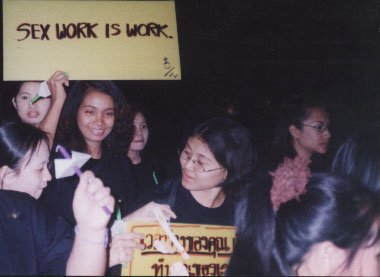Changing the Narrative of Migrant Sex Workers

Changing the Narrative of Migrant Sex Workers
In the Bangkok Post, Leah Carter writes an extensive article on the unique plight of migrants in the Thai sex work business. She considers the intersecting stigmas they face and the choices they make when deciding to get involved in sex work. This article also tackles some of the questions I have been asking of similar articles, such as the consideration of human trafficking and violence toward sex workers. Additionally, the article touches on the moral concerns behind the Thai government’s reluctance to change the punitive laws surrounding sex work.
The article begins with the account of a woman named Mai Junta, whose family migrated to Thailand from Myanmar when she was a baby. She began to support her family at age 10 and, by her mid-twenties, learned that working in the sex industry offers pay up to tenfold the national minimum wage. Mai’s extra income helped her to take care of her family, as many migrants must do. However, the article does not shy away from the risks of sex work, especially in the migrant community. Mai’s position as both a sex worker, which is illegal in Thailand, and a migrant exposes her to double the stigma, since “establishments wishing to employ migrants must work around strict laws and documentation, and entertainment industry work is met with a strong societal stigma.” Migrant workers are rejected at many entertainment centers, just as they are rejected in many other fields of work. When entertainment centers suspect a police raid is imminent, migrant workers are fired first. As opposed to large fines or prison sentences, migrants caught doing sex work can be deported or detained indefinitely, leaving their families without support. Even the rights that migrant workers are afforded are often not translated for them and, therefore, remain illegible to the migrant workers who can then be coerced and exploited by law enforcement. Even those who understand the law fear evoking it, since the gray area between working in an entertainment center and sex work has not been addressed by the law. This gray area leads to many protests against the nonsensicality of outlawing sex work but not the entertainment centers, which are practically indistinguishable.
For Mai, the discrimination she receives for being a sex worker outweighs the stigma attached to being migrant. She finds that she has to hide her occupation from her friends, lest they think less of her. She even notes a difference in how she is treated at government health centers. According to Ms. Hilton, a representative from the Empower Foundation, sex work is often conflated with human trafficking and thought of as inherently forced, immoral, and dangerous. She acknowledges that human trafficking did contribute to a substantial proportion of migrant sex workers in Thailand before the turn of the century, but she argues that now it is much rarer to see a sex worker who did not consent to their line of work. She credits widespread communication for keeping sex workers safer, as they are able to inform each other of dangers or opportunities. Officers with the Anti-Trafficking in Persons Division of the Royal Thai Police agree with Hilton’s claim that the vast majority of sex workers are not trafficked. However, Pol Col Thakoon, the representative from the ATPD, credits the legal pressure put on entertainment centers for the decrease in trafficking. Unsurprisingly, NGOs like Empower and the ATPD are opposed. NGOs find that the greater legal pressure, in the form of police raids and arrests, are harmful to the sex workers, especially migrants who can be detained. Once again, sex workers in Thailand are only asking for their line of work to be regarded as legal labor in the same way as any other job.
The pressure of being a migrant worker in a discriminatory climate is compounded by the stigma attached to sex work. While the idea of the immorality of sex work is proliferated everywhere and usually easily invalidated by arguments of bodily autonomy, the moral argument of sex work’s ties to human trafficking are more complex. While Thailand claims to have cut down on human trafficking, no one can ever be sure of the eradication of such an insidious industry. Thailand’s punitive laws do not address the problem but exacerbate it by punishing the sex workers indiscriminately. The previous article I read tackled the issue of these punitive laws as well. Both of these articles emphasize the role of female autonomy and the move into a more modern, destigmatized view of sex work. I particularly enjoyed this article because of its focus on the intersectionality of stigma and the way it touched on the fact that the Thai sex work economy is not completely insular, but rather deeply intertwined with the immigration and tourism industry.
Comments
Raisha,
Brilliant focus on what you call the “intersectionality of stigma”. I think you really grasp the subtle challenges and contradictions–too much focus on trafficking can inadvertantly reinforce stigma associated with sex work, but no attention to injustice is also problematic. As your thoughtful discussion might lead you to suspect, academics are engaged in vigorous debates about all these apsects. There is a clear focus emerging in your posts which might make for a very interesting paper.
Pages